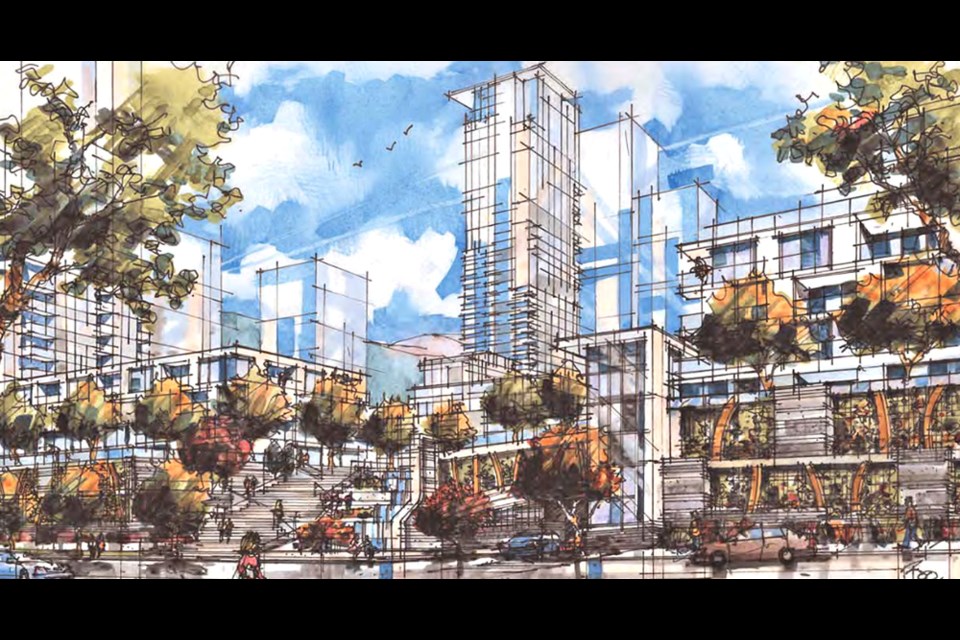The largest redevelopment project in Port Moody’s history could inch closer to reality on Tuesday.
That’s when council will consider second reading of zoning amendments for the city’s Coronation Park neighbourhood to accommodate a new high-density, master-planned community that would be home to up to 5,000 new residents.
The proposed project, by Vancouver-based developer Wesgroup Properties, includes:
- six residential towers up to 31 storeys
- a six-storey rental building with 101 units available on a rent-to-own program
- a four-storey office building
- commercial space for a grocery and drug store
- two daycares
- a 2.5-acre park
- 2,000 sq. ft. of indoor community amenity space
- a pedestrian overpass connected to the Inlet Centre SkyTrain station
If second reading is approved, Port Moody residents will get a final opportunity to weigh in on the project at a subsequent public hearing before it can advance to third reading and ultimately final approval.
While council granted first reading of the zoning amendments in May, it asked Wesgroup to address several issues prior to second reading, including:
- an independent financial review to justify Wesgroup’s failure to meet the city’s expectation that 15 percent of residential units be below-market rentals
- detailed design guidelines for the entire project
- more information about the design, funding and construction timing for the pedestrian overpass
- a study of how the company will manage transportation demand
According to a report authored by Port Moody’s assistant manager of planning Wesley Woo, a review of Wesgroup’s financial plan by an independent consultant concurs with the developer’s assertion that including below-market rental units would require significantly more residential density or higher towers be added to the project to make it financially viable.
Last February, Wesgroup’s senior vice-president of development Brad Jones said Port Moody will already realize more than $91 million in benefits from the project, including the park, amenity space and the new pedestrian overpass.
Woo said design work on the pedestrian overpass “has significantly advanced” since May, although some specifics — such as its width and the design of its railings — still need to be worked out.
Woo said the developer has committed to spend $6 million on the structure, although, he added, that’s likely not enough to get the job done. He said the city is looking at various other options to secure additional funding.
Also, Woo said, the city would like the project to be included in the first phase of construction, rather than Wesgroup’s plan to build it as part of the development’s third phase.
“Delivery of this amenity as early as possible and feasible is the city’s expectation.”
Woo added the timing for construction of the overpass could be included in the development agreement.
As well, the city will work with Wesgroup to refine its transportation management plan that includes wayfinding, parking for bikes and car shares, enhanced transit shelters and informing residents about alternate forms of transportation.
As for the overall design of the development, Woo said city staff is still reviewing the guidelines for the project and that should be completed by the time the zoning amendments hit fourth reading.
The ambitious project has had a tumultuous ride since Port Moody council first approved amendments to its official community plan in 2017 to pave the way for densification of the 14.8-acre neighbourhood at the corner of Ioco Road and Barnet Highway that’s comprised of 59 aging single-family homes.
Along the way, some of its current residents have complained of living in limbo as the ongoing uncertainty left them unable to plan for their futures.
In 2021, the project even teetered on the brink of collapsing altogether as the developer and council struggled to find common ground on issues like the height of the residential towers, density, affordable housing, public amenities, traffic management and even the potential impacts of a plan by Polygon Homes to build 5,500 new homes in the 10-acre Coronation Heights neighbourhood right next door in Coquitlam.
“We are struggling to see a path forward,” said Wesgroup’s Jones at the time.




